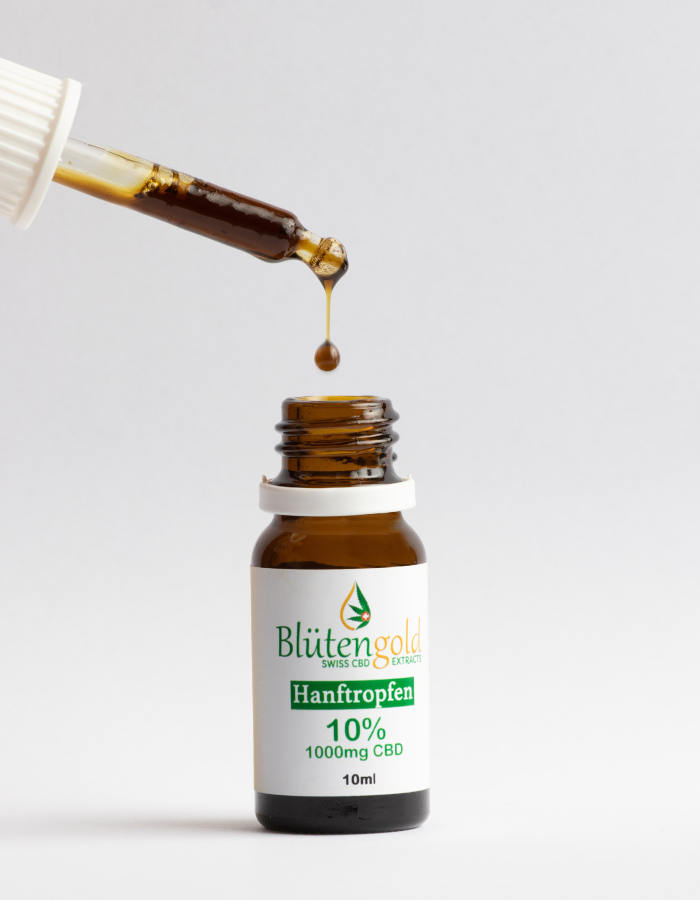What is
CBD?
CBD is the abbreviation for cannabidiol, an active ingredient found in the hemp plant. Alongside THC, CBD is the best-known of more than a hundred cannabinoids that have been discovered in the hemp plant to date. CBD is the main active ingredient in the hemp plants that are legally cultivated in Switzerland today. In contrast to THC (tetrahydrocannabinol), cannabidiol is not intoxicating, but has many positive effects on health.
What is
CBD?
CBD is the abbreviation for cannabidiol, an active ingredient found in the hemp plant. Alongside THC, CBD is the best-known of more than a hundred cannabinoids that have been discovered in the hemp plant to date. CBD is the main active ingredient in the hemp plants that are legally cultivated in Switzerland today. In contrast to THC (tetrahydrocannabinol), cannabidiol is not intoxicating, but has many positive effects on health.
Effect of CBD
CBD can naturally support certain healing processes, with a wide range of possible applications. From inflammation, sleep and anxiety disorders to pain, CBD can be a possible alternative to conventional treatment options. The broad spectrum of effects of cannabidiol is due to the fact that our body has its own cannabinoid system, which has an influence on most processes in our body. CBD does not bind to the receptors of the endocannabinoid system, but acts as an inhibitor for the breakdown of the body’s own cannabinoids (endocannabinoids). This allows the body’s own system to work more efficiently and regain its balance. The sleep-promoting properties of CBD allow the body to relax and regenerate optimally during the resting phase. The stress-reducing effects of CBD increase concentration and performance. The success of using cannabidiol varies from person to person. What can be said, however, is that CBD does not have an intoxicating effect, but has a mildly balancing, soothing effect and supports the healing process.
Side effects of CBD
So far, no side effects have been proven when used properly. The most common side effects of CBD, such as drowsiness or dizziness, diarrhoea or changes in eating behaviour and body weight, are often due to incorrect dosing or poor quality CBD.
Interactions
CBD is broken down in the liver, where it inhibits the enzymes (CYP2C19 and CYP2D6) that are responsible for the breakdown of certain drugs. In concrete terms, this means that drugs that are broken down by the above-mentioned enzymes remain in the blood system for longer. If you regularly take medication belonging to one of these groups, you should discuss the use of CBD with your doctor.
IIsolate or full extract?
It is recommended to buy CBD products that contain a full extract of the hemp plant with all its active ingredients. Together with the other cannabinoids and terpenes, the full effect of CBD unfolds, in contrast to products that are mixed with artificial or isolated CBD.
What is decarboxylation?
Decarboxylation is a chemical process in which the cannabinoids CBDA and THCA are activated. The active ingredients CBD and THC are only present in nature in their acidic form, as so-called CBDA and THCA. CBDA and THCA have hardly any effect compared to their activated form. This is also the reason why the consumption of raw cannabis flowers has little or no effect. In order to activate the active ingredients, the cannabis is decarboxylated. This means that the plant material or extract is heated over a certain period of time, whereby a chemical decomposition process is greatly accelerated. During this process, a carbon dioxide molecule (carboxy group) is split off from the CBDA and THCA, leaving the two active ingredients in their activated form, as CBD and THC.
For comparison: A non-decarboxylated CBD oil with a CBD content of 10% has about the same effect as a decarboxylated CBD oil with a content of 3%
Is CBD legal?
The purchase, consumption and sale of products made from the hemp plant with a THC content of less than one per cent is legal in Switzerland.
Important note:
CBD is not a medicinal product. This text is for information purposes only and does not under any circumstances replace a visit to the doctor and an examination by a medical professional. If you have any problems or questions, please contact your doctor.

Possible areas of application:
- Stress related symptoms
- Burnout and depression
- Sleep and anxiety disorders
- Inflammations
- Pain (in general)
- Psychotic episodes
- Migraine – Muscular tensions
- Sickness
- Appetite inhibition
- Addiction cessation (e.g. alcohol, opiates, nicotine, THC, sleeping pills, etc.)
- Spasticity
- PMS, menstrual cramps and menopause
- For relaxation and recovery
Is CBD suitable for animals?
Just like in humans, CBD also offers a number of health benefits for our four-legged friends. This is because cats, dogs and horses, just like all other mammals, have what is known as an endo-cannabinoid system. This means that CBD can also be used in animals for a number of ailments. For example with:
- Stress and anxiety
- Chronic or acute pain
- Age-related complaints
- Lack of appetite
- Strengthening the immune system.
How should I dose CBD oil for animals?
It is generally recommended to start with a low dose and slowly increase it until the desired effect is achieved. In addition, it is advisable to distribute the appropriate dose throughout the day (morning-midday-evening) for chronic complaints and to administer the appropriate dose directly for acute complaints such as panic attacks, injuries or stress situations, etc. Depending on the size and symptoms of the animal, the initial dose can be calculated using the following values.
- Low dosage: 0.1 mg CBD per kg body weight, 1-3 times per day
- Medium dosage: 0.5 mg CBD per kg body weight, 1-3 times per day
- High dosage: 1.0 mg CBD per kg body weight, 1-3 times per day


